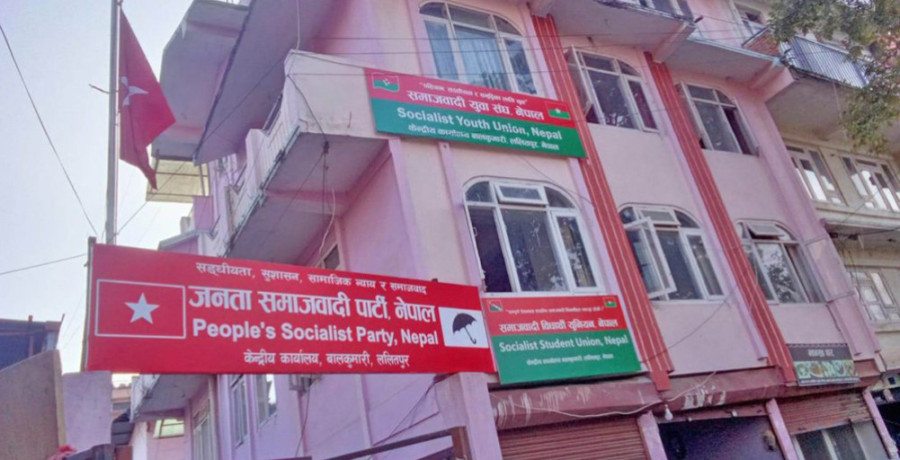Politics
JSP-Nepal could tip the scales on ordinances
The ruling Congress-UML coalition is strong in the lower house, but upper house remains a battleground.
Purushottam Poudel
The present government, which is often described as a strong administration having nearly two-thirds majority in Parliament, is in fact walking a tightrope even to pass bills with a simple majority.
The KP Sharma Oli government that commands an overwhelming majority in the lower house can’t pass bills without support from fringe political parties in the upper house.
Now, the government needs support from the Upendra Yadav-led Janata Samajbadi Party-Nepal (JSP-Nepal) to endorse the ordinances in the upper house.
CPN-UML chief whip Mahesh Bartaula said the government has 32 seats in the 59-member assembly. He expressed confidence in getting the JSP-Nepal’s support to endorse the ordinances and then the replacement bills.
Though the JSP-Nepal appears to have a soft corner for the Oli government, party chief Upendra Yadav, however, has so far kept his cards close to his chest.
From Tuesday, the JSP-Nepal started discussing the nitty-gritty of the ordinances with experts from relevant fields.
“As the ordinances cover a wide array of issues, our party held a discussion with experts in land and forest on Tuesday,” Raj Kishor Yadav, the vice-chair of the party said. “On Wednesday we continue our discussions with experts from other fields, including economics, and finalise our position on the ordinances.”
A JSP-Nepal leader, requesting anonymity, however, claimed that the party is likely to vote in favour of ordinances in both Houses.
JSP-Nepal voted in favour of Oli when he sought a trust vote in July, but the party is not in the Oli Cabinet.
The government presented six ordinances issued by the Oli government last month to fast-track the law-making process in the meeting of the House of Representatives on the first day of the winter session that commenced on January 31. Those ordinances will be tabled for passage on Thursday.
The opposition parties, on the other hand, have registered 50 notices of rejection against the ordinances at the Parliament secretariat. The ruling parties have to reject these notices before tabling the ordinances for approval.
Leaders from the ruling coalition claimed they have enough lawmakers in the House of Representatives to defeat the rejection notices and pass the ordinances.
“The ordinances will be passed from the House of Representatives on Thursday,” said Mahesh Bartaula, the chief whip of CPN-UML.
The ruling parties—the Nepali Congress, 88, and the UML, 77, (excluding Speaker Devraj Ghimire and suspended lawmaker Top Bahadur Raymajhi)—command 165 seats in the 275-member House of Representatives, which is more than the simple majority required. They also have the support of the Loktantrik Samajbadi Party and Unmukti Party, which are part of the government.
But the situation in the upper house is drastically different.
The ruling parties have 27 seats in the National Assembly. The Congress and the UML have 16 and 10 seats, respectively, while the Mahantha Thakur-led Loktantrik Samajbadi Party (LSP) has one seat. Additionally, two of the three Assembly members by the President on the government’s recommendation—chair Narayan Dahal, Bamdev Gautam and Anjan Shakya—are expected to support the government. Former UML leader Gautam, who is in negotiation with UML leaders to rejoin the party, is expected to support the government while Shakya, a committed UML member, is certain to vote in favour of the bills. Chair Dahal, who can cast a vote in the event of a tie, will certainly follow his party’s [Maoist Centre] line.
The main opposition party—the CPN (Maoist Centre)—is the largest in the National Assembly, with 17 seats (excluding chair Narayan Dahal). The CPN (Unified Socialist) has eight seats, and JSP-Nepal has three seats. The Rastriya Janamorcha has 1 seat.
In the 59-strong assembly, either side needs 30 votes to prevail.
Despite this, UML chief whip in the House of Representatives, Mahesh Bartaula, is confident that the ruling side will secure a majority in the National Assembly as well.
Bartaula claims that the three JSP-Nepal lawmakers and two of the President-appointed members (Gautam and Shakya), will vote in favour of the ordinances.
“The ruling parties will have 32 votes in the National Assembly when the ordinance is tabled for endorsement,” said Bartaula.
He asserted that the ruling coalition is confident both the Houses will endorse the ordinances. “Therefore, the question of what if it fails to get a pass from the National Assembly is irrelevant,” Bartaula argued.
However, Jhakku Prasad Subedi, a National Assembly member from the Maoist Centre, says that the passage or rejection of the ordinance will hinge on the role of the JSP-Nepal.
“Neither the ruling nor the opposition parties have a clear majority in the National Assembly, so JSP-Nepal’s vote will be decisive,” said Subedi.
Som Bahadur Thapa, a former secretary of the Parliament, says that if the National Assembly rejects an ordinance that the House of Representatives has endorsed, it will not become law.
“For an ordinance to become law, it must be passed by both Houses. Otherwise, its validity is nullified,” said Thapa.
If a bill passed by the House of Representatives fails in the National Assembly, a joint sitting of both Houses can vote on it. However, this provision does not apply to ordinances, says Subedi.
The government can only proceed with presenting and endorsing replacement bills once the ordinances are approved by both Houses.




 18.12°C Kathmandu
18.12°C Kathmandu















